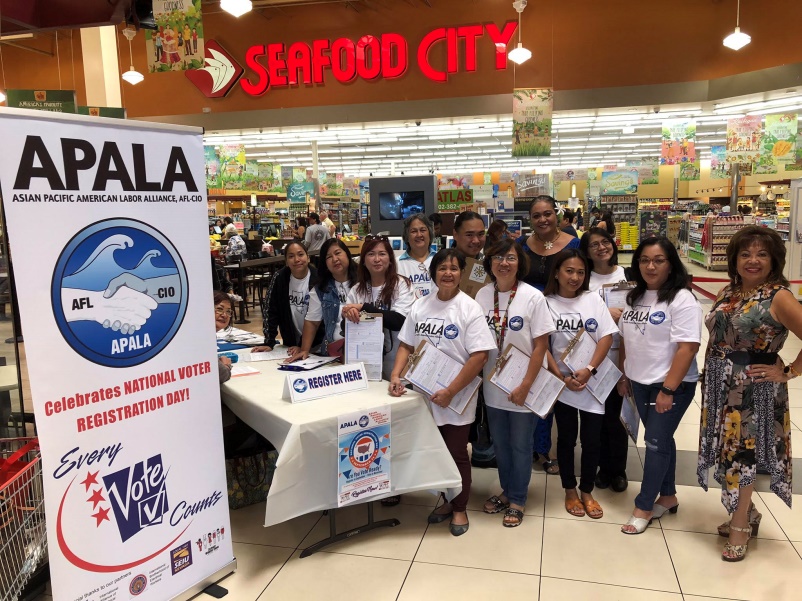By Grace Vergara-Mactal, SEIU and Gloria Caoile, APALA

Kung flu.
Chinese virus.
These aren’t hurtful taunts from schoolchildren overheard on the playground.
They’re the words of the sitting President of the United States of America — and they have fanned the flames of bigotry against Asian Americans and Pacific Islanders throughout the course of the pandemic.
This week, as we came together to mark Labor Day, the consequences of Donald Trump’s failed presidency are still being felt in AAPI working families across the country. Trump’s disastrous coronavirus response has inflamed existing racial inequalities and economic disparities in AAPI communities. Thanks to Trump, AAPIs are being disproportionately impacted by a historic recession — and scapegoated for a pandemic that his own administration has utterly failed to contain.
For months, AAPIs have been bearing the double burden of a cratering economy and Trump’s reckless attempts to stoke xenophobia against our community. Since the coronavirus crisis began, nearly half of Asian American households have experienced a loss in employment income, compared to 43% of white households. Last week, the Labor Department revealed that the unemployment rate for Asian Americans in August was 10.7% — over two points higher than the jobless rate for workers overall.
On top of that, AAPI-owned small businesses have been hit especially hard as a consequence of Trump’s failing economy and reckless rhetoric. Small businesses are the lifeblood of AAPI communities, and an important source of jobs for new immigrants. A quarter of restaurants and hotels in the United States are owned by Asian Americans, along with 17% of retail stores. In Nevada, AAPI small businesses were among the first to suffer the economic impacts of the pandemic as unjustified fears of contracting the virus prompted customers to steer clear of Asian-owned stores.
But while small business owners struggled to stay afloat and some even closed up shop permanently, the Trump administration’s Paycheck Protection Program shut out many entrepreneurs of color in favor of large corporations. In April, the Center for Responsible Lending found that 75% of Asian-owned businesses “stand close to no chance of receiving a PPP loan through a mainstream bank or credit union.”
Meanwhile, approximately two million Asian Americans across the country are on the frontlines of the fight against the virus as essential workers. In Nevada alone, AAPIs make up 19% of health care workers — the highest share of the workforce. As essential workers, they are facing exposure to COVID every day and fighting to keep Nevadans safe. But even as AAPIs play a critical role in combating the coronavirus, a disastrous lack of planning and willful neglect under Trump has left them without adequate PPE or critical labor protections — and in the crosshairs of the virus.
In particular, the pandemic has taken an outsize toll on Filipinos, who are well-represented in the health care sector and four times more likely to be nurses than any other group in the country. By the end of August, Filipinos tragically made up 30% of coronavirus-related deaths among registered nurses in the United States. And many Filipino frontliners fighting the deadly virus at work are scared of bringing it home and infecting their loved ones.
With one in five AAPI seniors in Nevada living in multigenerational households with school-age children, social distancing can be close to impossible — and community spread is a serious concern. In Clark County alone, AAPIs make up 10% of the population but account for nearly 17% of coronavirus deaths.
To make matters worse, AAPIs are facing an alarming surge in anti-Asian sentiment and hate attacks. By the end of March, hate crimes against Asian Americans skyrocketed to approximately 100 per day on average. In Nevada, AAPIs have become the target of verbal abuse and bigoted attacks, mirroring incidents in countless other states.
Despite this, Trump has doubled down on his reckless rhetoric, continuing to trot out racist terms like ‘kung flu’ and ‘Chinese virus’ to describe the coronavirus — even though experts have warned his language exacerbates anti-Asian sentiment.
It’s the same page out of Trump’s old playbook: he wants Americans pointing the finger at each other, in order to deflect blame from his own failures. But no matter what he says, Trump can’t distract from the truth: his ineffective pandemic response and failed leadership have cost AAPIs our lives and our livelihoods. We deserve better than the president’s dangerous rhetoric and devastating economic policies.
Nevada has long been ground zero for AAPI organizing. Since 2000, the Silver State has seen its AAPI population grow 167%. Today, we make up 10% of the electorate in this critical battleground state. Mobilizing the growing AAPI vote is key to ensuring Democratic victories and building a better future for working families.
Now more than ever, AAPIs need leadership that will help our community build back better, and strive to bring Americans together — not tear us apart. Joe Biden and Kamala Harris have a proven track record of standing shoulder-to-shoulder with us in the fight for fair wages, safe working conditions, and a voice on the job. With Joe and Kamala in the White House, AAPIs will have a seat at the table and strong allies in the fight to put power back in the hands of workers.
This fall, the AAPI community can go from being marginalized under Trump to delivering the margin of victory for Joe Biden, Kamala Harris, and Democrats up and down the ballot. Together, we can help turn the page on this failed presidency once and for all.
***
Grace Vergara-Mactal is the Executive Director SEIU Local 1107, which represents over 9,000 nurses and other health care workers across Nevada.
Gloria Caoile is a founding member of the Asian Pacific American Labor Alliance (APALA), where she currently serves as the Director of Civic Engagement in Nevada.




